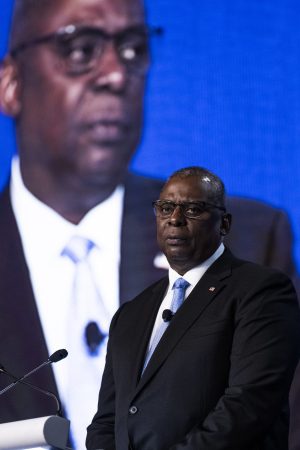Prospects for a renewed high-level military dialogue between China and the United States remain dim, with Beijing saying their defense chiefs will not hold a bilateral meeting while both are attending a weekend security conference in Singapore.
U.S. Defense Secretary Lloyd Austin is scheduled to address the Shangri-La Dialogue on Saturday, while Chinese Defense Minister General Li Shangfu will speak at the gathering on Sunday.
Foreign Ministry spokesperson Mao Ning on Tuesday blamed the U.S., saying Washington should “earnestly respect China’s sovereignty and security interests and concerns, immediately correct the wrongdoing, show sincerity, and create the necessary atmosphere and conditions for dialogue and communication between the two militaries.”
Mao gave no details, but tensions between the sides have spiked over Washington’s military support and sales of defensive weapons to self-governing Taiwan, China’s assertions of sovereignty to the contested South China Sea and its flying of a suspected spy balloon over the United States.
Previous reporting also indicated that Beijing would refuse attempts to set up a meeting as long as the Chinese defense minister remains under U.S. sanctions. Li was sanctioned under the Countering America’s Adversaries Through Sanctions Act (CAATSA), which attempts to deter purchase of Russian military technology, back in 2018. At the time, Li was the director of the Equipment Development Department of China’s military, where he oversaw the purchase of Su-35 fighter jets and the S-400 missile defense system from Russia.
Austin met privately with Li’s predecessor, Wei Fenghe, at last year’s Shangri-La Dialogue, which appeared to do little to smooth relations between the sides. In his address to the forum, Wei accused the United States of seeking to contain China’s development and threatening to assert its claim to Taiwan by military force.
Chinese leader Xi Jinping and U.S. President Joe Biden met on the sidelines of the Group of 20 meeting of large economies in November in Indonesia, but contacts have proceeded only sporadically since then, largely through side meetings on neutral territory.
U.S. Secretary of State Antony Blinken canceled a visit to Beijing in February after the U.S. shot down a Chinese spy balloon that had crossed the United States. He later met with the Communist Party’s senior foreign affairs adviser Wang Yi on the sidelines of the Munich Security Conference.
In the past month, official meetings have ramped up. Wang met with U.S. National Security Advisor Jake Sullivan in Austria for detailed talks over the course of May 10 and 11, and last week China’s Commerce Minister Wang Wentao visited the United States to attend an APEC meeting and hold bilateral meetings with his U.S. counterparts. In between those two exchanges, China’s new ambassador to the United States, Xie Feng, took up his post, pledging to “enhance China-U.S. exchanges and cooperation.”
However, China-U.S. military dialogues have always been fraught and are often the first to fall victim to tensions in the bilateral relationship. Back in February, China refused to take a phone call from Austin to discuss the balloon issue, the Pentagon said. Always beset by mistrust and accusations, communications on the military level have yet to show signs of improvement.
Beijing also was angered by Taiwanese President Tsai Ing-wen’s April stopover in the U.S. that included an encounter with House Speaker Kevin McCarthy. China’s People’s Liberation Army holds military exercises and sends fighter jets, drones, and ships near the island to advertise its threat to attack and wear down Taiwan’s defenses.
China also protests movements of U.S. Navy ships and aircraft through the Taiwan Strait and close to Chinese-held islands in the South China Sea, dispatching its own ships and planes. U.S. officials have called for increased exchanges between the two militaries to address the possibility of confrontations or collisions during close encounters.

































